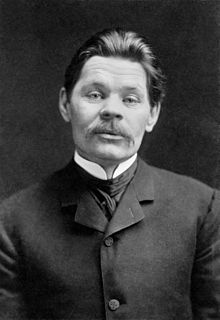
Alexei Maximovich Peshkov, primarily known as Maxim Gorky, was a Russian and Soviet writer, a founder of the socialist realism literary method, and a political activist. He was also a five-time nominee for the Nobel Prize in Literature. Prior to his renown as an author, he frequently changed jobs and roamed across the Russian Empire; these experiences would later influence his writing. Gorky's most famous works were The Lower Depths (1902), Twenty-six Men and a Girl (1899), The Song of the Stormy Petrel (1901), My Childhood (1913–1914), Mother (1906), Summerfolk (1904) and Children of the Sun (1905). He had associations with fellow Russian writers Leo Tolstoy and Anton Chekhov; Gorky would later mention them in his memoirs.
Maxim or Maksim may refer to:

The Kirov-class cruisers were a class of six cruisers built in the late 1930s for the Soviet Navy. After the first two ships, armor protection was increased and subsequent ships are sometimes called the Maxim Gorky class. These were the first large ships built by the Soviets from the keel up after the Russian Civil War, and they were derived from the Italian cruiser Raimondo Montecuccoli, being designed with assistance from the Italian Ansaldo company. Two ships each were deployed in the Black and Baltic Seas during World War II, while the last pair was still under construction in the Russian Far East and saw no combat during the war. The first four ships bombarded Axis troops and facilities after the Germans invaded the Soviet Union in June 1941. All six ships survived the war and lingered until the 1970s in training and other secondary roles before being scrapped.

The Tupolev ANT-20 Maksim Gorki was a Soviet eight-engine aircraft, the largest in the world during the 1930s. Its wingspan was similar to that of a modern Boeing 747, and was not exceeded until the 64.6-metre (212 ft) wingspan Douglas XB-19 heavy bomber prototype first flew in 1941.

The Siege of Sevastopol also known as the Defence of Sevastopol or the Battle of Sevastopol was a military battle that took place on the Eastern Front of the Second World War. The campaign was fought by the Axis powers of Germany and Romania against the Soviet Union for control of Sevastopol, a port in the Crimea on the Black Sea. On 22 June 1941 the Axis invaded the Soviet Union during Operation Barbarossa. Axis land forces reached the Crimea in the autumn of 1941 and overran most of the area. The only objective not in Axis hands was Sevastopol. Several attempts were made to secure the city in October and November 1941. A major attack was planned for late November, but heavy rains delayed it until 17 December 1941. Under the command of Erich von Manstein, Axis forces were unable to capture Sevastopol during this first operation. Soviet forces launched an amphibious landing on the Crimean peninsula at Kerch in December 1941 to relieve the siege and force the Axis to divert forces to defend their gains. The operation saved Sevastopol for the time being, but the bridgehead in the eastern Crimea was eliminated in May 1942.

"The Song of the Stormy Petrel" is a short piece of revolutionary literature written by the Russian writer Maxim Gorky in 1901. The poem is written in a variation of unrhymed trochaic tetrameter with occasional Pyrrhic substitutions.
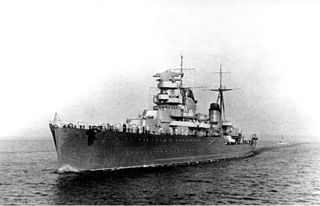
Maxim Gorky was a Project 26bis Kirov-class cruiser of the Soviet Navy that saw action during World War II and continued in service into the Cold War. The ship's bow was blown off by a mine in the Gulf of Riga during the opening stages of Operation Barbarossa, but she made it to Kronstadt for repairs. However, after being repaired, the ship was trapped in harbour for most of the war, by Axis minefields at Leningrad and Kronstadt. Despite being trapped, Maxim Gorky was active in two engagements: the ship provided gunfire in support for the defenders during the Siege of Leningrad, and she later bombarded Finnish positions during the Vyborg–Petrozavodsk Offensive in mid-1944. She saw no further action in World War II. A major modernization was begun in 1953, but the navy reconsidered the cost-effectiveness of the refit and work was cancelled in 1955. Maxim Gorky was sold for scrap in 1959.

The Project 670 Skat submarine was a nuclear-powered cruise missile submarine built for the Soviet Navy and later operated by the Russian Navy. All Charlie I/II-class submarines are decommissioned. One Charlie-class submarine was used for testing an Oniks missile. Charlie I and its successor Charlie II-class submarines are designed by the Lazurit Central Design Bureau of Gorky.
Maxim is a male first name of Roman origin. It is common in Slavic-speaking countries, mainly in Belarus, Bulgaria, Macedonia, Montenegro, Russia, Serbia and Ukraine. The name is derived from the Latin family name Maximus, meaning "the greatest". Maxim is also a less well-known surname.

Hakob Hakobian, was a Soviet Armenian poet, the founder of Armenian proletarian poetry. Communist party member from 1904. Awarded with the titles People's Poet of Armenia and People's Poet of Georgia. He was considered as the "Armenian Maksim Gorky" by the Bolshevik press.

TS Maxim Gorkiy was, until 30 November 2008, a cruise ship owned by Sovcomflot, Russia, under long-term charter to Phoenix Reisen, Germany. She was built in 1969 by Howaldtswerke-Deutsche Werft, Hamburg, West Germany for the German Atlantic Line as TS Hamburg. In late 1973 she was very briefly renamed TS Hanseatic. The following year she was sold to the Black Sea Shipping Company, Soviet Union and received the name Maksim Gorkiy in honour of the writer Maxim Gorky, renamed to Maxim Gorkiy after collapse of the Soviet Union in 1991. On 20 August 2008 Maxim Gorkiy was sold to Orient Lines. She was due to enter service with her new owners on 15 April 2009 under the name TS Marco Polo II, but in November 2008 the relaunch of the Orient Lines brand was cancelled. On 8 January 2009 the ship was sold for scrap, and she was beached at Alang, India on 26 February 2009.

Bovadzor is a town in the Lori Province of Armenia. During the Soviet era, the town was named for the Soviet writer, Maxim Gorkiy.

Dmitry Lvovich Bykov is a Russian writer, poet and journalist. He is also known as biographer of Boris Pasternak, Bulat Okudzhava and Maxim Gorky.
Phoenix Reisen is a Germany-based travel agency that also operates a fleet of cruise ships. The company first entered the cruise business in 1988 by chartering the Soviet Union-owned cruise ship SS Maxim Gorkiy.

The Youth of Maxim is a 1935 Soviet historical drama film directed by Grigori Kozintsev and Leonid Trauberg, the first part of trilogy about the life of a young factory worker named Maxim.
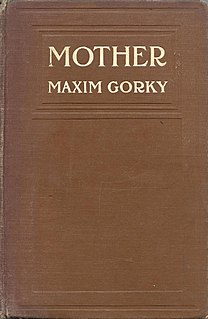
Mother is a novel written by Maxim Gorky in 1906 about revolutionary factory workers. It was first published, in English, in Appleton's Magazine in 1906, then in Russian in 1907.
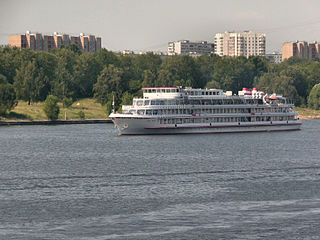
The Maksim Gorkiy is a Maksim Gorkiy-class (Q-040) Soviet/Russian river cruise ship, cruising in the Volga – Neva basin. The ship was built by Österreichische Schiffswerften AG at their shipyard in Korneuburg, Austria, and entered service in 1974. Maksim Gorkiy is the most comfortable river cruise ship currently in service with Vodohod. Her sister ship is Aleksandr Pushkin. Her home port is currently Nizhny Novgorod.
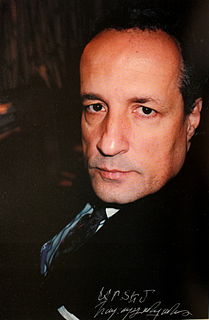
Artem Harutyunyan is an Armenian writer, translator, critic, Doctor of Philology, Professor, member of Writers Union of Armenia,

The bombing of Gorky by the German Luftwaffe was the most destructive attack on Soviet war production on the Eastern Front in World War II. It lasted intermittently from October 1941 - June 1943, with 43 raids carried out.















